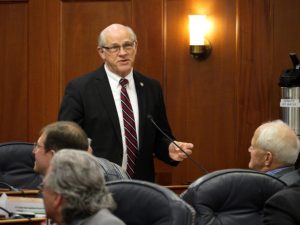
State lawmakers want to repeal parts of a new law that requires them to declare a wider range of conflicts of interest. The legislative Ethics Committee has ruled that the law prohibits more activities than the bill’s sponsors intended. And senators say that’s creating practical obstacles to them serving their constituents.
Lawmakers passed a law, House Bill 44, last year that covers a wide range of ethics issues. It started with a focus on requiring lawmakers to be more transparent when they, their immediate families or their employers financially benefit or face harm from bills they vote or take other official action on.
But lawmakers are unhappy with how the law is being interpreted by the Select Committee on Legislative Ethics. The committee has ruled that the law bars lawmakers from talking with constituents about pending bills if they have a conflict.
Palmer Republican Sen. Shelley Hughes said the law caused her to withdraw a bill, Senate Bill 27, to provide incentives to patients to seek lower-cost health care. It would have affected an organization her husband — who’s a physician assistant — works for.
“Although there may have been good intentions, this law actually prevents me from serving my constituents and from working on behalf of the best interest of Alaskans,” she said.
The Senate Rules Committee introduced a bill Wednesday, Senate Bill 89, to repeal the new conflict of interest provisions. It would keep in place the other parts of the ethics law.
Sen. John Coghill, the committee chairman, said the new rules are raising a major question.
“Can I even do my duties as a legislator without bumping into this very broad definition that has now emerged from our Ethics Committee?” he said.
Coghill, a North Pole Republican, said the major debates over the state budget and criminal justice laws leave little time to debate ethics again this year.
“To step back is the best thing to do while we’re dealing with some very tough issues in this legislative session,” he said. “We still want (the) highest standards, (and the) best ethical behavior.”
Repealing the conflict of interest changes would return the state to the previous standard for declaring ethics. Right now, the law requires lawmakers to say they have a conflict when they are affected financially more than the general public. If the provision is repealed, conflicts would be a lot more rare. For example, a doctor wouldn’t declare a conflict on a bill benefiting doctors, as long as they personally don’t benefit more than other doctors.
Coghill said there’s interest in the bill in both chambers. But the move to repeal the conflict of interest provisions is drawing concern from the ethics watchdogs who supported the law.
Judy Andree, the president of the League of Women Voters Alaska, said lawmakers should make changes narrower than repealing the new requirements. If there are practical barriers to doing it this year, she’d like to see it happen next year.
“I just think they should leave it and come back to it, if they see over this session there are some parts of it that need to be revised,” she said.
By passing the legislation last year, the Legislature headed off a ballot initiative that could have enacted a similar law. Andree said the initiative could be revived if the Legislature repeals the rules without raising the conflict of interest standards.
Former Rep. Jason Grenn is an Anchorage independent who sponsored the law. He said the law should be tweaked to address the practical problems lawmakers are facing in meeting with constituents. But he’s disappointed with the repeal.
“I’m supportive of those changes, but a complete repeal, I don’t take it personally, but I think the public would take it personally — that they wanted these changes, and in less than a year, senators and elected officials are already going back on that,” he said.
The bill has been referred to the Senate Judiciary Committee.
Andrew Kitchenman is the state government and politics reporter for Alaska Public Media and KTOO in Juneau. Reach him at akitchenman@alaskapublic.org.




